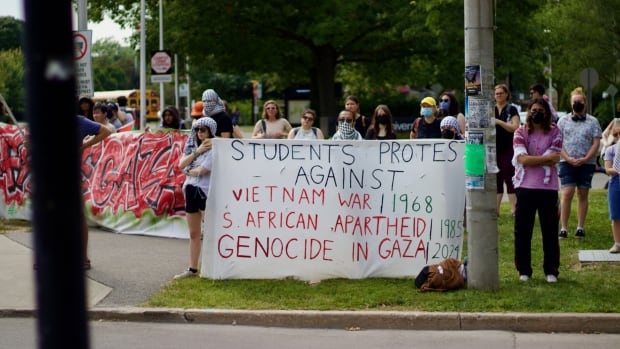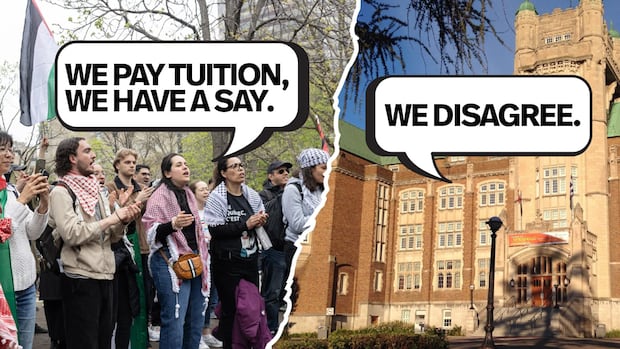
McMaster University’s board of governors heard a presentation this week advocating that the Hamilton institution divest from companies with ties to Israel.
The board did not take any immediate action, but chair Jane Allen said they had learned from the presenters, who spoke on behalf of the McMaster chapter of Solidarity for Palestinian Human Rights (SPHR).
“We have heard your concerns,” Allen said.
The board hearing the presentation was a condition for the dismantling of a student-led pro-Palestinian protest encampment that had been in place for 2½ weeks in May.
Four students with SPHR didn’t share their names either at the presentation or to CBC Hamilton, and declined an on-the-record interview, citing safety concerns related to people sharing advocates’ personal information online.
Protesters at universities across Canada and the U.S. are demanding an end to Israel’s war against Hamas in Gaza amid a growing humanitarian crisis — and want their schools to divest from companies they say profit from the conflict. But what does the process of that divestment look like?
Board members did not make any new motions during the meeting, which went into closed session after SPHR’s presentation, McMaster University spokesperson Wade Hemsworth said in an email Thursday.
“As the board chair said at the beginning of the board meeting, the goal of the presentations today was not to seek immediate answers, but a chance to deepen understanding of the various viewpoints,” he said.
McMaster is among many universities in North America with students advocating for a boycott, divest and sanctions (BDS) strategy in response to Israel’s military actions in Gaza during its conflict with Hamas.
Health officials in Gaza say Israel’s campaign has killed more than 42,000 Palestinians. It does not distinguish between fighters and civilians, but more than half of the dead are believed to be women and children.
Israel launched the campaign in October 2023 after an attack led by the militant group killed about 1,200 people and led to about 250 being taken hostage.
Critics have denounced Israel’s actions as genocide — a charge the government denies.
SPHR says protesters on right side of history
SPHR is a recognized student group at McMaster that advocates for Palestinian rights. In this week’s presentation, students compared today’s BDS movement to student protests against apartheid in South Africa, saying universities distanced themselves from students at the time, but history has proven them wrong.
The presentation made several arguments in favour of McMaster divesting from Israel and ending official partnerships with that country’s academic institutions. One argument was the university has committed to environmental sustainability, and war is ecologically harmful. They also said that, according to Palestinian officials, all 12 of Gaza’s higher-education institutions have been destroyed in the war.
The students were joined by Michael Lynk, a Western University law professor who was the United Nations Special Rapporteur on the situation of human rights in the Palestinian Territory occupied between 1967 and 2016.
“Actually applying human rights involves hard conversations and challenging choices, but doing so invariably means that the decision-maker ends up improving the world and landing on the right side of history,” he said.
SPHR said it has support from other campus groups, including McMaster Faculty4Palestine. Writing on behalf of that group, faculty members Ameil Joseph, Ali Iqbal, Catherine Clase, Gabby Inglis, Tom Alexander and Katherine Boothe penned an op-ed in the Hamilton Spectator this week.
“After witnessing 12-plus months of genocide and 75 years of illegal occupation, apartheid and oppression, we ask that McMaster University’s board of governors listen to our students and divest from companies complicit in these atrocities,” they said.
Two board members asked questions after the presentation. Saara Greene, a social sciences professor, asked for examples of what other schools are doing. The students pointed to Ontario Tech University’s decision to publicly post a report outlining its investments and financial holdings as a positive example.
In response to a question from linguistics professor Catherine Anderson about how cutting ties with Israeli academic institutions might impact academic freedom, the students said a BDS strategy could still allow for individual partnerships with Israeli academics.
Jewish students say BDS is antisemitic
Before SPHR’s presentation, representatives from Jewish student group Hillel McMaster spoke against BDS, saying the movement is antisemitic. They also shared negative experiences, with one saying they felt socially excluded by classmates who found out they visited Israel and another saying they’d been spat on while holding a vigil on campus for victims of the Oct. 7, 2023, attacks.
Around the world, students are calling on their universities to ‘disclose and divest’ their investments in companies and organizations linked to Israel. Andrew Chang explains why many universities are rejecting those calls and how past divestment movements have laid the groundwork for today’s protests.
Greene responded to the presentation, saying “antisemitism is real and it’s something that McMaster University, as well as other spaces, need to address more effectively than it has been.”
However, she said that as a Jewish faculty member and board member, she does not believe BDS is inherently antisemitic.
Alice Pinheiro Walla, a philosophy professor who spoke for Hillel McMaster, said she doesn’t think the university is a safe space for discussion about the conflict.
“Any form of disagreement is considered genocidal.”
Neither Hillel McMaster nor Pinheiro Walla responded to email requests for comment before publication.

